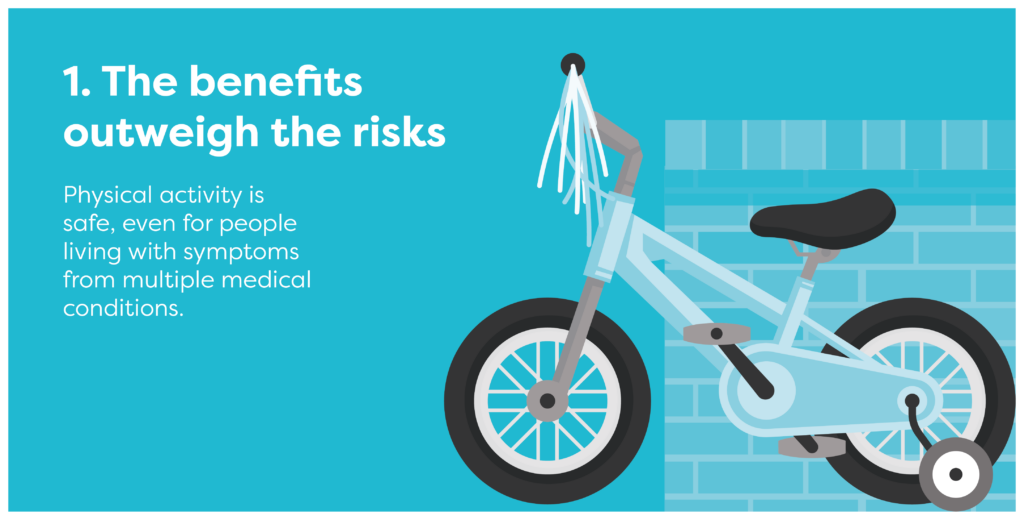Experts say benefits of physical activity outweigh the risks for people with long-term health conditions
New consensus statement to offer guidance for healthcare professionals that physical activity can be used to manage majority of long-term health conditions.

- New consensus statement, supported by the Deputy Chief Medical Officer, concludes that benefits of physical activity for people living with long-term conditions “outweigh the risks”
- People with long-term health conditions are twice as likely to be inactive than those without
- Organisations including Sport England, Office for Health Improvement and Disparities and the Faculty of Sport and Exercise Medicine UK will work in partnership to break down the barriers to activity for the 15 million people living with long-term conditions in England
A new consensus statement, led by the Faculty of Sport and Exercise Medicine UK and developed through review of the scientific evidence and expert clinical and patient consensus, has concluded that the benefits of physical activity far outweigh the risks for people living with long-term health conditions. The statement, published in the British Journal of Sports Medicine, finds that physical activity is safe – even for people living with symptoms of multiple long-term conditions.
Physical activity has a key role to play in the management of long-term conditions, including diabetes, heart disease and cancer. The International Society for Physical Activity and Health (ISPAH) identifies the integration of physical activity into healthcare as one of the eight best investments to combat inactivity.
However, there are many barriers to getting active for people living with long-term health conditions – including fears that physical activity may worsen their symptoms, and requirements to gain medical clearance prior to increasing activity levels. This means that people with long-term conditions, who have much to gain from being active, are twice as likely to be inactive than those who do not have a health condition.
The new consensus statement aims to break down these barriers by clarifying fundamental safety considerations and bridging the gap between evidence, clinical and public health guidelines and people’s lived experience. It seeks to equip healthcare professionals with the knowledge they need to discuss physical activity with symptomatic people in a person-centred way, addressing the understandable concerns that patients have about the impact of physical activity on symptoms. It also recognises that pre-participation medical clearance is an unnecessary barrier to physical activity and challenges the need for it.
As part of a system-wide approach to promoting physical activity, consistent messaging from healthcare professionals around the benefits balanced with risks will also help reduce the barriers to engagement. Sport England, the Office for Health Improvement and Disparities, the Richmond Group of charities and the Faculty of Sport and Exercise Medicine UK will now work with partners in the health, sport and physical activity sectors to empower and support people living with long-term health conditions to have the confidence to become more active.
The statement is made up of five ’impact statements’ that highlight the key messages. In addition, in response to patient recommendation, eight symptom-based statements discuss specific risks for musculoskeletal pain, fatigue, shortness of breath, cardiac chest pain, palpitations, poor blood sugar control, cognitive impairment and frailty.
Find out more and read the statement here.
Dr Jeanelle de Gruchy, Deputy Chief Medical Officer
“There has previously been some concern that long-term conditions could be made worse by physical activity. However, the evidence is that physical activity has an important role to play in preventing and treating many conditions and that, for most people with long-term conditions, the benefits outweigh the risks. This expert consensus, supported by the Office for Health Improvement and Disparities, will help healthcare professionals to have informed, personal conversations with their patients living with long-term conditions.”
Tim Hollingsworth, CEO of Sport England
“Breaking down the barriers that make it harder for the 15 million people living with long-term health conditions in England to get active is critical to tackling health inequalities: a key aim of our Uniting the Movement strategy. This new consensus statement is a really positive step – it will play a vital role in supporting healthcare professionals to empower their patients to get active in a way that is right for them. In future, our ambition is for this work to be embedded into the sport and physical activity sector too, ensuring a joined-up approach between the different sectors that support people’s health.”
Dr Natasha Jones, President-Elect of the Faculty of Sport and Exercise Medicine UK
‘We need to build our patients’ confidence and motivation to move more, because moving more makes nearly everybody feel better. The medical professions and the fitness industry will work together to create and support a new generation of empowered people, living with long term conditions, confident in their own ability to be more active.”
Dr Andrew Boyd, Physical Activity & Lifestyle lead, RCGP
“This guidance will help healthcare colleagues, in primary care and beyond, share the best available evidence when supporting people with long-term conditions to move more, every day. I commend all patient facing clinical staff to read the statement, share with their colleagues, and build the principles into their consultations, with the aim of making every contact count.”